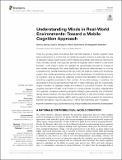Files in this item
Understanding minds in real-world environments : toward a mobile cognition approach
Item metadata
| dc.contributor.author | Ladouce, Simon | |
| dc.contributor.author | Donaldson, David I. | |
| dc.contributor.author | Dudchenko, Paul A. | |
| dc.contributor.author | Ietswaart, Magdalena | |
| dc.date.accessioned | 2020-01-30T17:30:01Z | |
| dc.date.available | 2020-01-30T17:30:01Z | |
| dc.date.issued | 2017-01-12 | |
| dc.identifier | 266041838 | |
| dc.identifier | 1f2cf900-a790-4f5a-8ce0-4cfee91dca72 | |
| dc.identifier | 85010857595 | |
| dc.identifier.citation | Ladouce , S , Donaldson , D I , Dudchenko , P A & Ietswaart , M 2017 , ' Understanding minds in real-world environments : toward a mobile cognition approach ' , Frontiers in Human Neuroscience , vol. 10 , 694 . https://doi.org/10.3389/fnhum.2016.00694 | en |
| dc.identifier.issn | 1662-5161 | |
| dc.identifier.uri | https://hdl.handle.net/10023/19388 | |
| dc.description | This work is supported by a scholarship from the University of Stirling and a research grant from SINAPSE (Scottish Imaging Network: A Platform for Scientific Excellence). | en |
| dc.description.abstract | There is a growing body of evidence that important aspects of human cognition have been marginalized, or overlooked, by traditional cognitive science. In particular, the use of laboratory-based experiments in which stimuli are artificial, and response options are fixed, inevitably results in findings that are less ecologically valid in relation to real-world behavior. In the present review we highlight the opportunities provided by a range of new mobile technologies that allow traditionally lab-bound measurements to now be collected during natural interactions with the world. We begin by outlining the theoretical support that mobile approaches receive from the development of embodied accounts of cognition, and we review the widening evidence that illustrates the importance of examining cognitive processes in their context. As we acknowledge, in practice, the development of mobile approaches brings with it fresh challenges, and will undoubtedly require innovation in paradigm design and analysis. If successful, however, the mobile cognition approach will offer novel insights in a range of areas, including understanding the cognitive processes underlying navigation through space and the role of attention during natural behavior. We argue that the development of real-world mobile cognition offers both increased ecological validity, and the opportunity to examine the interactions between perception, cognition and action—rather than examining each in isolation. | |
| dc.format.extent | 2122185 | |
| dc.language.iso | eng | |
| dc.relation.ispartof | Frontiers in Human Neuroscience | en |
| dc.subject | Cognitive neuroscience | en |
| dc.subject | Ecological validity | en |
| dc.subject | EEG | en |
| dc.subject | Embodiment | en |
| dc.subject | Mobile brain imaging | en |
| dc.subject | Situated cognition | en |
| dc.subject | BF Psychology | en |
| dc.subject | RC0321 Neuroscience. Biological psychiatry. Neuropsychiatry | en |
| dc.subject | Psychiatry and Mental health | en |
| dc.subject | Behavioral Neuroscience | en |
| dc.subject | Biological Psychiatry | en |
| dc.subject | Neurology | en |
| dc.subject | Neuropsychology and Physiological Psychology | en |
| dc.subject | SDG 3 - Good Health and Well-being | en |
| dc.subject.lcc | BF | en |
| dc.subject.lcc | RC0321 | en |
| dc.title | Understanding minds in real-world environments : toward a mobile cognition approach | en |
| dc.type | Journal item | en |
| dc.contributor.institution | University of St Andrews. School of Psychology and Neuroscience | en |
| dc.identifier.doi | https://doi.org/10.3389/fnhum.2016.00694 | |
| dc.description.status | Peer reviewed | en |
This item appears in the following Collection(s)
Items in the St Andrews Research Repository are protected by copyright, with all rights reserved, unless otherwise indicated.

